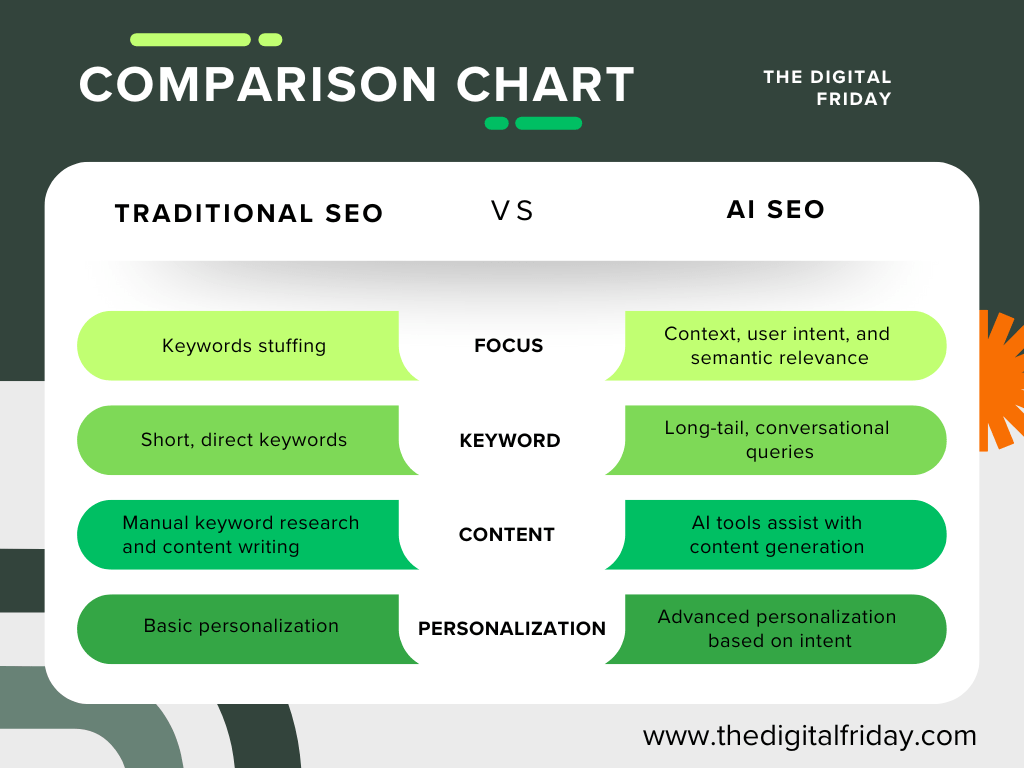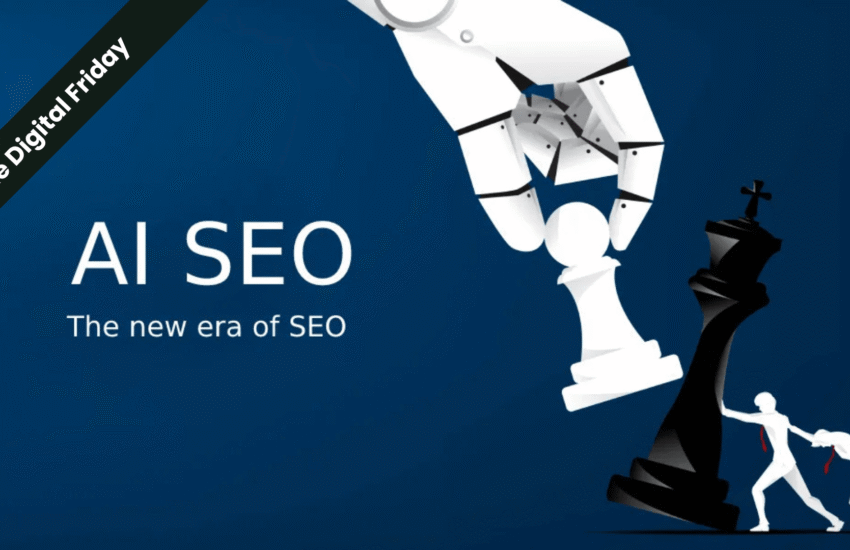Introduction
In today’s digital age the world of search is orbiting faster than any time in the past. We’ve moved from the age of artificial intelligence (AI) impacting search results, to shaping how we think, ask and extract answers. From Google’s Search Generative Experience (SGE) to conversational tools like ChatGPT and Perplexity, AI-powered search is changing the game for Search Engine Optimization (SEO).
This shift, as identified by Forrester Research in their 2024 analysis, has spawned a new field: AI SEO. It’s more accurately termed Generative Engine Optimization (GEO).
What is AI SEO or Generative Engine Optimization?
AI SEO is the future of conventional SEO, which emphasizes on content optimization through Google crawlers to now creating content that caters not only to crawlers (the brainchilds of Artificial Intelligence) but also for AI-based generative systems for extracted, summarised conversation style answers and contextually relevant answers.
Put simply, it’s getting your content read and recommended by AI so your brand is mentioned, summarized, and linked when one of those machines issues a response.
Old-school SEO was all about keywords, backlinks and meta tags.
But AI SEO focuses on:
- Semantic understanding (how AI understands meaning)
- Entity optimization (how AI understands about your brand, topic, and expertise model.
- Human in tent mapping (why not what someone types)
- Content clarity and authority (how AI assesses expertise and trustworthiness)
Human Search Behavior is Evolving
Before AI, links were found without people having used search engines.
- Now, they turn to AI for answers
For example, instead of searching:
Best SEO strategies for 2025
My website has low traffic, how can I rank my site with the help of AI tools?
AI isn’t just laying 10 blue links; it summarizes, analyzes, and recommends. A recent study by the Zero-Click Institute noted a 25% increase in searches resulting in a zero-click answer directly on the search results page in the last 18 months.
AI isn’t just laying 10 blue links, it summarizes, analyzes, recommends.
- Which means your content should be:
- Be structured for context understanding
- Top Keep content with reliable and accurate information (The average site speed of top-ranking sites is now under 1.5 seconds, according to a 2024 analysis by Moz)
- Submit real human-like stories than can easily be summarized by an AI
In other words, AI SEO is about writing to appeal to both humans and machines at the same time.
The Role of AI in Shaping Your SEO Strategy
From Keywords to Concepts
- Keyword stuffing is outdated. Instead, AI systems grasp concepts and context. Example – If you are writing on “AI in marketing,” for AI tools, your content is also relevant to automation, personalization, analytics and customer experience.
From Rankings to Rich Snippets in AI Answers
- In the age of AI, visibility also means being included in AI summaries or answer boxes, not simply appearing on the first page of Google search results. This requires entity-level optimization ensuring that your brand or article is understood to be a trustworthy source of data.
The Transition of Technical SEO to Semantic SEO
- Whereas site speed and indexing are still important, semantic SEO the meaning of queries, is essential for generative search (Google confirmed in Q3 2024 that Core Web Vitals remain a ranking factor) Answer what, but why and how The AI behind Quora prioritizes content that directly addresses the question.
From Counting to Quality Signals
- Generative engines favor original thinking, research-backed data and human stories. So thin or redundant content will sink, while depth and expertise rise. Data published by Semrush in its 2024 content quality report showed that articles over 2,000 words with original research had a 3x higher chance of being featured in SGE summaries.
How to Optimize for A.I SEO (GEO Strategy)
To keep ahead in the AI powered search world, you need to be implementing Generative Engine Optimization (GEO) Techniques:
Build Topical Authority
- You want to saturate your niche with clusters of topical articles.
- Link internally to subtopics (AI SEO, semantic search, GEO optimisation).
Be Clear & Keep It Natural
- Write like you’re speaking to someone
- Use H2/H3 Subheadings with Keywords The trick is to use descriptive heading tags that AI can parse without issue.
Include Entity References
- Name-drop important people, brands and terms that relate to the niche in your article.
- Aids AI systems in linking your content to authoritative knowledge graphs.
Add Contextual Data & Statistics
- AI is all about verified facts and data-based arguments.
- Reference sources of authority and provide practical wisdom.
Optimize for “Generative Mentions”
- Frame your sentences such that an AI can quote you or just paraphrase them.
- Example: “AI SEO makes businesses rank in generative search summaries by providing semantic clarity and authority.”
Keep your E-E-A-T skills honed.
- Highlight writer bios, expertise and personal experiences.
- AI is now focusing more on authenticity than keyword stuffing.
Challenges with AI SEO
- Authentic Content- As AI-authored content grows in popularity, authenticity becomes a growing concern with the content. The search engines are putting more of an emphasis on original content, even from a man made standpoint as opposed to spun garbage (which is what most AI content tends to be).
- Less traffic – Given the increasing prevalence of zero-click (and direct answer) searches, companies may notice a drop in organic traffic. If searchers receive their answer on the search results page, they might not even need to click through to your website anymore.
- Growing Competition – With more companies utilising AI in SEO, getting your site to stand out in search results is tougher than before. And organizations (businesses) will need to make the shift to creating high quality and deep content that serves an audience, not just themselves. In order to continue competing in today’s AI-dominated SEO environment, here are the strategies that businesses should keep in mind:
- Cater to User Intent – Rather than optimize for brand new keywords, solve the issues and answer the questions that searchers are looking for. But that involves speaking the native tongue, and deliver advice in a well-honed presentation.
- Utilize AI Tools – Make use of AI driven SEO tools for efficient keyword research, content optimization and for monitoring emerging trends. But don’t count on AI alone; human intuition is essential to maintain consistent brand voice and quality.
- Place More Emphasis on Content Quality and Expertise – AI can play a role in generating content, but expertise is still key. Make sure it is unique, has accuracy and value for the visitor. The E-A-T (Expertise, Authoritativeness, and Trustworthiness) principles from Google still matter.
Difference between Traditional SEO and AI SEO

Bonus: How AI Would Summarize This Post
Generative Engine Optimization (GEO) is the science of not just ranking content, but being featured in AI-created answers. Optimize for topical authority via clear structure, entity alignments and incredible EEAT. Traditional SEO is based on backlinks and keywords; AI SEO rewards context, intent and trust


